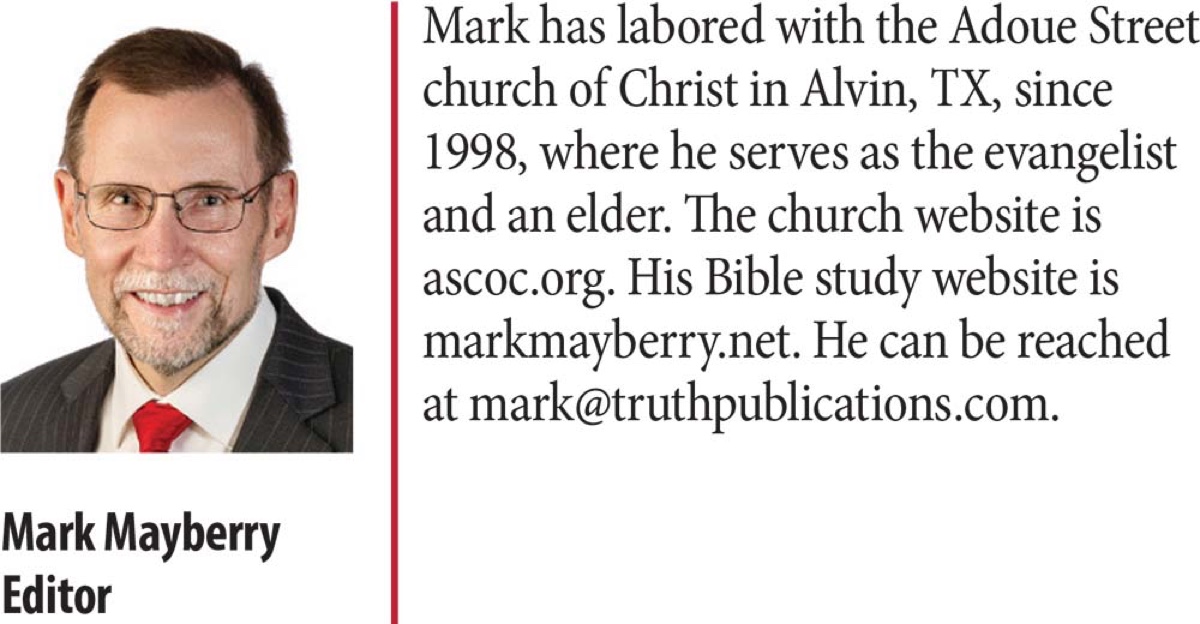
by Mark Mayberry
Mark Twain once wrote, “Courage is resistance to fear, mastery of fear, and not the absence of fear.” God is the source of true courage: “Wait for the LORD; Be strong and let your heart take courage; Yes, wait for the LORD” (Ps. 27:14).
Merriam-Webster defines a “crisis” as “(1) the turning point for better or worse in an acute disease or fever; an emotionally significant event or radical change of status in a person’s life; (2) the decisive moment (as in a literary plot); (3) an unstable or crucial time or state of affairs in which a decisive change is impending; especially: one with the distinct possibility of a highly undesirable outcome (as a financial crisis).” The word “crisis” has been in use since the fifteenth century. It traces its derivation through Middle English, and Latin to the Greek krisis.
The Greek word krisis, derived from krinō (to judge, decide), identifies “a decision” or “a judgment” (Thomas, 2920). Louw and Nida say it refers to “the legal decision rendered by a judge, whether for or against the accused, and should be rendered ‘verdict,’ ‘sentence,’ or ‘judgment’” (56.24).
Bauer, Danker, Arndt and Gingrich define it as “(1) legal process of judgment [and is used] of the activity of God or the Messiah as judge, especially on the Last Day (2 Thess. 1:5); (2) a board of judges, court, specifically, a local court (Matt. 5:21); (3) administration of what is right and fair, right in the sense of justice/righteousness (John 7:24)” (BDAG, 569).
So, how does this underlying meaning relate to our topic? The Greek word krisis signifies a time when we are called into judgment, either by God (in time or eternity) and also (potentially) in courts of men. From the standpoint of eternity, those who are unprepared to stand before God on the last day will face a calamitous crisis. On a temporal level, when someone is tried in civil or criminal court, his future hangs in the balance—freedom and/or fortune may be lost. Other crises also arise: disease and death, difficulties in our physical or spiritual families, occasions when division and doctrinal error rears its ugly head in the church, etc.
In this special issue of Truth Magazine, Darin Henry addresses the question, “How do we handle the stress when sickness hits close to home?” Darin, and his wife, Karen, along with Forrest and Sue Morris, are members of the Adoue Street congregation. Cancer casts its spectral shadow over these homes. Sometimes we take others for granted, but in times of crisis, we witness their underlying commitment and courage. I am impressed with the remarkable grace in which these two families are presently facing serious illnesses.
From an intellectual standpoint, we know that death is an inescapable reality—we are all terminal. From a biblical standpoint, we know that “it is appointed for men to die once, and after this comes judgment” (Heb. 9:27). What about when it hits close to home? Don Hooton offers an article on “Dealing with Death.” He lost his dad during the COVID crisis. Don addresses the question, “How do we handle the sorrow when a loved one dies?”
On Thursday, November 18, 2021, Sherelyn and I drove to Kemp, TX, to visit with Gene and Aleta Samford—dear friends and dedicated workers in the kingdom. Gene was recently diagnosed with terminal pancreatic cancer. While it is appointed for men once to die and afterwards stand before the judgment seat of God (Heb. 10:29; 2 Cor. 5:10), few people are mindful of either appointment. However, not Gene and Aleta. In years past, both experienced the anguish of losing their respective spouses. Gene lost Carol; Aleta lost Steve. Some years later, Gene and Aleta found each other. Joy replaced sadness. Hope and happiness were renewed. Love and laughter filled their home.
Now they are facing an ordeal that neither wished nor wanted; yet their faith is strong. As we visited with Gene and Aleta, their focus was on spiritual matters. Gene preached his “last sermon” the previous Sunday, in which he offered parting commendations and challenges to his brethren, friends, and family. In our conversation, he was grateful for the opportunity of preaching the gospel, appreciative of the support that has come from Aleta, and the encouragement of countless brothers and sisters in Christ.
Jimmy Stevens offers these observations about Andrew Eugene “Gene” Samford:
Having received encouragement in his younger years to preach the gospel, Gene Samford became a “Barnabas”, an “encourager” in the church. Following an extended illness, he lost his first wife. A few years later, he married my sister, Aleta Walker, who had lost her husband. Working together, they successfully encouraged brethren to seek unity and forgiveness, and to be a “friendly congregation”, without compromising truth. In his last work, he encouraged the men of the congregation to develop their talents in teaching, preaching, and leading prayers and songs. As his health began declining, he witnessed the fruit of his encouragement when a number of these brethren stepped up to fill in for him.
Anne Stevens (wife of Jimmy) composed the following comments:
Of all the activities Aleta Samford has enjoyed in this life, teaching Bible classes is among the most loved. God alone knows the hours and effort she has spent to help others gain a better understanding of God and His will for mankind. In marrying Gene Samford, a preacher of the gospel, she accepted the responsibilities, joys and disappointments that come with being a preacher’s wife. Her faith has equipped her to serve the Lord and His servant, Gene, in a confident and gentle way, loving the Lord’s people and helping Gene to serve them well. As sisters-in-law, some of our most special moments together have been spent sharing our faith and experiences as fellow Christians and preachers’ wives.
On December 10th, I spoke with Aleta. Gene is now bedfast and the toxins in his body are clouding his mind and memory. A lonely vigil awaits. Yet, through the tears, she expressed gratitude, and a confidence borne of lifelong commitment. In the darkest moments, God’s light radiates through the lives of His faithful followers. [Gene passed away on the 13th and his funeral was held on the 18th.]
Sometimes we remain faithful until our kids do wrong, until our friends depart from the faith. If family and friendship are more important to us than “the faith of the gospel,” we may rationalize their actions and rethink our previously held convictions. Will we stand when others compromise? Will our faith fail in times of trial? Alan Finley, who is father of four faithful Christians, and who also serves as an elder of the Lord’s church, addresses the subject: “How do we handle circumstances where our children or brethren manifest a spirit of disobedience?”
The Mosaic law required that faith take precedence over family (Deut. 13:6-11). Despite being the Prince of peace, Jesus serves as a source of conflict—a flash point of contention—between those committed to His ways, and those who pursue the path of rebellion (Matt. 10:21-22, 34-39).
Brother Robert Harkrider addresses the question, “How do we handle circumstances when a local congregation experiences division?” Kyle Pope considers, “How do we handle circumstances when a brother in Christ teaches doctrinal error?” Both situations represent a spiritual crisis for all involved: the offending individual(s) fostering division or promoting error, and the congregation, which must decide how to confront the problem. Will they stand on principle, or be swayed by personality?
Brother Melvin Curry addresses the subject, “Dealing with Distractions.” Crises may arise because we become distracted and do not take advantage of present opportunities. Lamenting Judah’s impending destruction, Jeremiah said, “Harvest is past, summer is ended, and we are not saved” (Jer. 8:20). Satan suggests delay: As the apostle Paul was discussing righteousness, self-control and the judgment to come, Felix became frightened and said, “Go away for the present, and when I find time, I will summon you” (Acts 24:25).
While the Roman poet Horace used the phrase “carpe diem” (Latin: “pluck the day” or “seize the day”) to express the idea that one should enjoy the present moment, God’s word adds a level of seriousness:
And working together with Him, we also urge you not to receive the grace of God in vain—for He says, “AT THE ACCEPTABLE TIME I LISTENED TO YOU, AND ON THE DAY OF SALVATION I HELPED YOU.” Behold, now is “THE ACCEPTABLE TIME,” behold, now is “THE DAY OF SALVATION” (2 Cor. 6:1-2).
In times of crisis, God’s people may be pressured to compromise in various ways. King Nebuchadnezzar demanded that Shadrach, Meshach, and Abed-nego bow before the golden image that towered over the plain of Dura. Their response inspires us to remain true to our convictions:
O Nebuchadnezzar, we do not need to give you an answer concerning this matter. If it be so, our God whom we serve is able to deliver us from the furnace of blazing fire; and He will deliver us out of your hand, O king. But even if He does not, let it be known to you, O king, that we are not going to serve your gods or worship the golden image that you have set up (Dan. 3:16-18).
Consider also the story of Polycarp (AD 69-155), a Christian bishop of Smyrna, who, according to tradition, died a martyr, bound and burned at the stake. According to post-apostolic The Martyrdom of Polycarp:
As he was brought forward, the tumult became great when they heard that Polycarp was taken. And when he came near, the proconsul asked him whether he was Polycarp. On his confessing that he was, [the proconsul] sought to persuade him to deny [Christ], saying, “Have respect to your old age”, and other similar things, according to their custom, [such as], “Swear by the fortune of Caesar; repent, and say, Away with the Atheists.”
But Polycarp, gazing with a stern countenance on all the multitude of the wicked heathen then in the stadium, and waving his hand toward them, while with groans he looked up to heaven, said, “Away with the Atheists.” Then, the proconsul urging him, and saying, “Swear, and I will set you at liberty, reproach Christ”; Polycarp declared, “Eighty-six years I have served Him, and He never did me any injury: how then can I blaspheme my King and my Saviour?”
In times of societal crisis, let us remember the words of the psalmist: “In God I have put my trust, I shall not be afraid. What can man do to me?” (Ps. 56:11). In times of personal crisis, let us remember the words of Isaiah: “Say to those with anxious heart, ‘Take courage, fear not. Behold, your God will come with vengeance; the recompense of God will come, but He will save you’” (Isa. 35:4). If persecution arises, let us remember the words of the Lord Jesus:
Do not fear those who kill the body but are unable to kill the soul; but rather fear Him who is able to destroy both soul and body in hell. Are not two sparrows sold for a cent? And yet not one of them will fall to the ground apart from your Father. But the very hairs of your head are all numbered. So do not fear; you are more valuable than many sparrows (Matt. 10:28-31). 
Arndt, William, et al. A Greek-English Lexicon of the New Testament and Other Early Christian Literature. Chicago: University of Chicago Press, 2000.
Louw, Johannes P. and Eugene Albert Nida. Greek-English Lexicon of the New Testament: Based on Semantic Domains. New York: United Bible Societies, 1996.
Merriam-Webster’s Collegiate Dictionary. Springfield, MA: Merriam-Webster, 1996.
St. Polycarp of Smyrna. “86 Years I Have Served Him.” SayingsoftheOrthodoxFathers (blog), November 8, 2017. https://sayingsoftheorthodoxfathers.com/2017/11/08/86-years-i-have-served-him-st-polycarp-of-smyrna/.
Thomas, Robert L. New American Standard Hebrew-Aramaic and Greek Dictionaries: Updated Edition. Anaheim: Foundation Publications, Inc., 1998.


